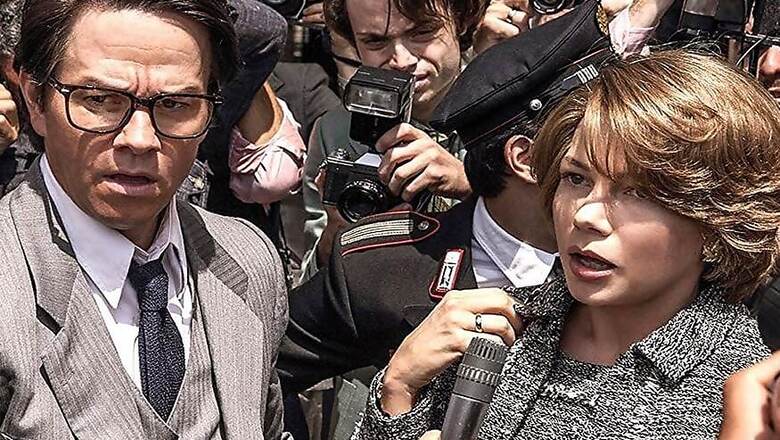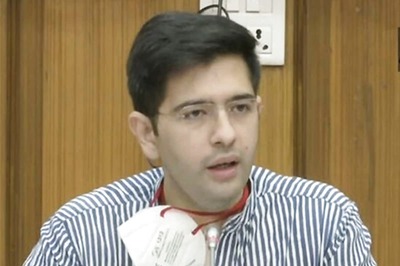
views
The specter of the Kevin Spacey allegations, following right on the heels of Harvey Weinstein’s, could have loomed large over All the Money in The World, and indeed did so until the Oscar-bait film’s actual release. So first, let us tip our hats to both director Ridley Scott (aged 80) and thespian Christopher Plummer (aged 88), as well as the rest of the production unit, for having exorcised it of even the slightest miasma. That too in nine days.
Following Scott’s decision to release his movie on the initially planned date while also scrubbing off all traces of scandal from its rushes, the cast and crew snowballed together to re-shoot all the scenes featuring J Paul Getty between November 20-29, with Plummer replacing Spacey in the role. And it’s quite the role.
J Paul Getty, was of course, the infamously miserly billionaire, who was at one time the richest man in the world. Getty, who made the majority of his fortune out of lucrative oil deals with Ibn Saud and the Saudi state, was widely known for his penny-pinching. The British-American magnate’s economic measures included installing pay phones at his sprawling estate in the English countryside to reduce telephone bills, and perhaps most notoriously, negotiating his eldest grandson’s ransom demand with the kidnappers.
It is this particular episode that Scott has captured for his cinema, and even if it’s not entirely Verité, it’s certainly an engaging crime periodical. In the summer of 1973, 16-year-old John Paul Getty III was kidnapped from Rome by members of 'Ndràngheta, the Calabrese mafia, and held captive at a mountain village while a ransom note demanding $17 Million for his safe return was sent to his family.
While some investigators suspected it was a hoax perpetrated by the teenager himself, others, well basically his ‘kind of estranged’ billionaire grandfather believed that giving into the kidnappers demands would expose his remaining 13 grandchildren to future kidnappings and, more importantly, his own fortune to future ransom demands, and so refused to pay up. Over several months of negotiations in which the kidnappers losing their patience and poor Paul III lost a ear, the ransom was finally whittled down to a relatively low 2.9 million dollars, with the Getty patriarch finally forking out $2.2 million (which was the highest tax-deductible amount) and lending the remainder of the sum to his son at a rate of 4% interest, which was presumably the ‘family rate’.
Scott sticks to most of the facts, though he doesn’t shy away from the occasional post-truth flourish. Paul Jr, Paul III’s father and the senior Getty’s son, is relegated to either narcotic and post-coital hazes or a wheelchair bound catatonic existence (the obvious results of his hedonism), while Paul III’s mother Abigail (Michelle Williams) is given the unenviable task of negotiating with the kidnappers as well as her former husband’s family and hanger-ons. Mark Wahlberg plays Fletcher Chase, a former CIA operative-turned wheeler-dealer for Getty Sr. who is sent to “advise and support" Abigail.
The cast do a commendable job, with Plummer of course, and Williams walking away with most of the applause. Whether he’s reading stock tickers or appraising a priceless art work or just being a tremendous cheapskate, Plummer carries himself with the sort of sociopathic éminence grise you’d expect from a titan of industry, without skipping a beat; until the film’s ending anyway, when his heart skips several (that’s hardly a spoiler, so don’t get mad about the lack of a trigger warning).
Williams, as the middle-class Abigail married into an a glut of wealth and influence, stays admirably restrained in front of her cinematic father-in-law, but lashes out in taut fear and anger when the scenes call for a mother worried about the life and safety of her son. Caught between a rock and a hard place, while simultaneously being hounded by a news-hungry Italian press, William manages to convey the despair and desolation as well as the resoluteness that the role demands.
And Mark Wahlberg is well, Mark Wahlberg - the serious actor, not the Mark Wahlberg of broad-accented action comedies and vapid blockbusters. He lets his co-stars score the dramatic points while playing it simple and efficient as would behoove an international fixer of deals. More importantly he doesn’t walk around shirtless in a single scene; there is a brief shot of him answering a phone-call literally between push-ups but hey, there’s still a bit of Marky in Mark.
And then there's the film itself. Given the power and hedonisms of various Getty family members and the funds at their disposal the film could have devolved into an incessant orgy of wealth and excess (a la The Wolf of Wall Street), yet Scott turns the gluttony into gravitas. In this he’s helped by the fact that Getty Sr. owned an incredible hoard of art treasures from around the globe and across history (the J. Paul Getty Trust established by him remains the world's richest art foundation) and Scott uses these several museums’ worth of masterpieces as symbols of the magnate’s influence and wealth.
Indeed even outside the sumptuously laid grounds of the Getty family estate, Scott provides us with a rich cinematic landscape with the rambling rural landscapes of Calabria juxtaposed against tight office shots of Rome’s red-tape layered bureaucratic agencies and the claustrophobia of an salacious media with its face always pressed against your windows. The Italian Mafiosi sing and cook and dance even as they discuss dismemberment or count ill-gotten stacks of money, while in the beautifully captured Eternal City a mother is bereft. And in the midst of it all, yet away from it, is a remote old man keeping an eye on the stock markets while turning his back on his own kith and kin. There truly are some things that money can't buy, but a ticket to this film is luckily one of them.
Rating: 3.5/5



















Comments
0 comment